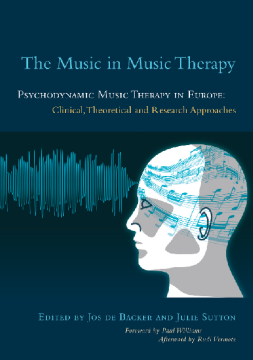
BOOK
The Music in Music Therapy
Dorothee Storz | Rita Maes | Jan Van Camp | Karin Schumacher | Elvira Martín Martín | Jenny Wigram | Paul Williams | Jos De Backer | Patxi Del Campo San Vicente | Janet Corry | Laurien Hakvoort | Adriano Primadei | Niels Hannibal | Lieselotte Ronse | Cathy Warner | Esa Ala-Ruona | Monika Noecker-Ribaupierre | Teresa Leite | Rachel Darnley-Smith | Jaakko Erkkilä | Julie Sutton
(2014)
Additional Information
Book Details
Abstract
Bringing together a wide range of European thought on music therapy practice, this book provides a deeper insight into the aspects of the therapeutic process which are enabled by music.
With a theoretical, psychodynamic approach and high quality clinical case material from across Europe, the editors stress the role of music within music therapy and show how essential the musician is within the identity of a music therapist.
The first of its kind, this comprehensive text is an invaluable resource for experienced music therapists worldwide, alongside students and trainees.
The Music in Music Therapy explores music and musical processes as central to music psychotherapeutic practice, primarily through case studies by clinicians from throughout Europe. With a focus on psychodynamic music therapy and the inclusion of cases with a variety of clientele, the book is a welcome addition to the growing literature addressing the role of music in music therapy. In addition to being drawn into the clinical presentations, I am excited and enriched by reading the theoretical material and perspectives on music therapy research that are included.
Professor Barbara L. Wheeler, PhD, MT-BC, Professor Emerita, Montclair State University, and retired professor, University of Louisville, USA
The contributors to this book show how it is possible to connect with important, unspoken truths in the lives of individuals, including very severely disturbed individuals, through music, and in so doing render new opportunities for expression of subjugated aspects of the self.
from the foreword by Professor Paul Williams
